Offers/Demands
Offers
Offers book is used to create and execute offers sent to customers. Entered information can be used to evaluate success and efficiency of executed offers.
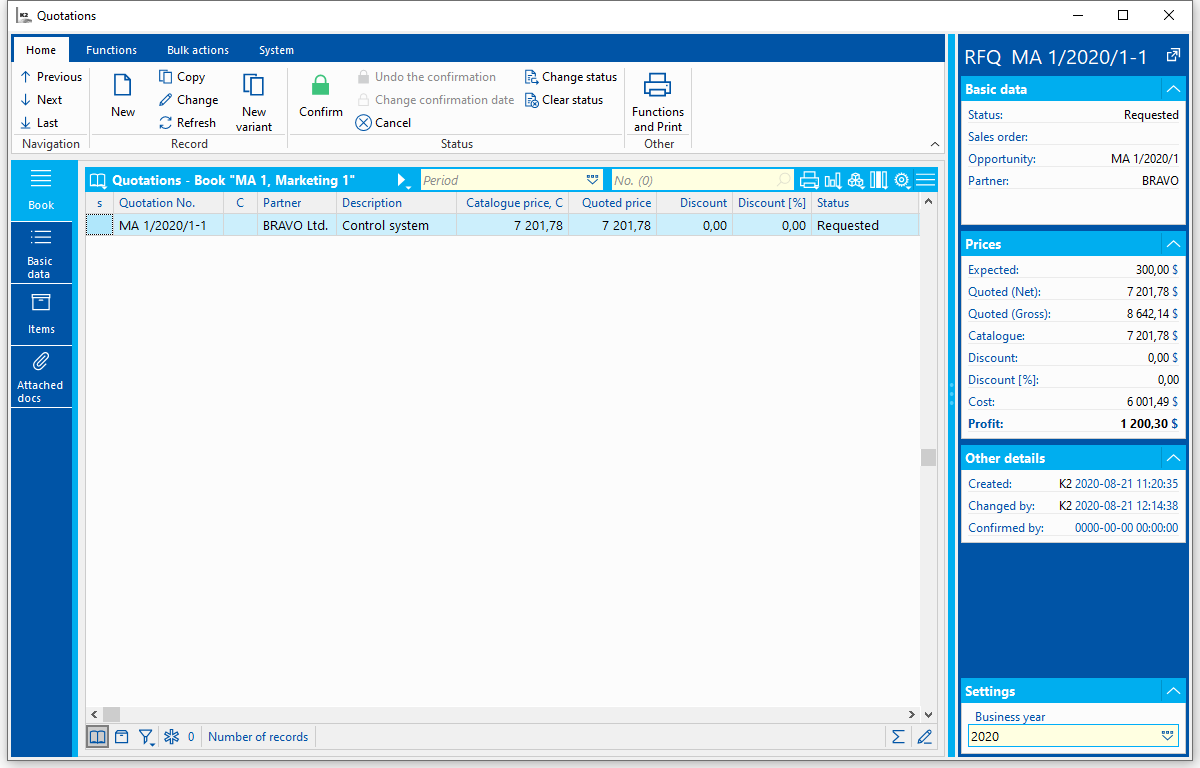
Picture: Offers -book
Basic Data (page 1)
First page of offer is used to display identification and basic data about offer and also some other information.
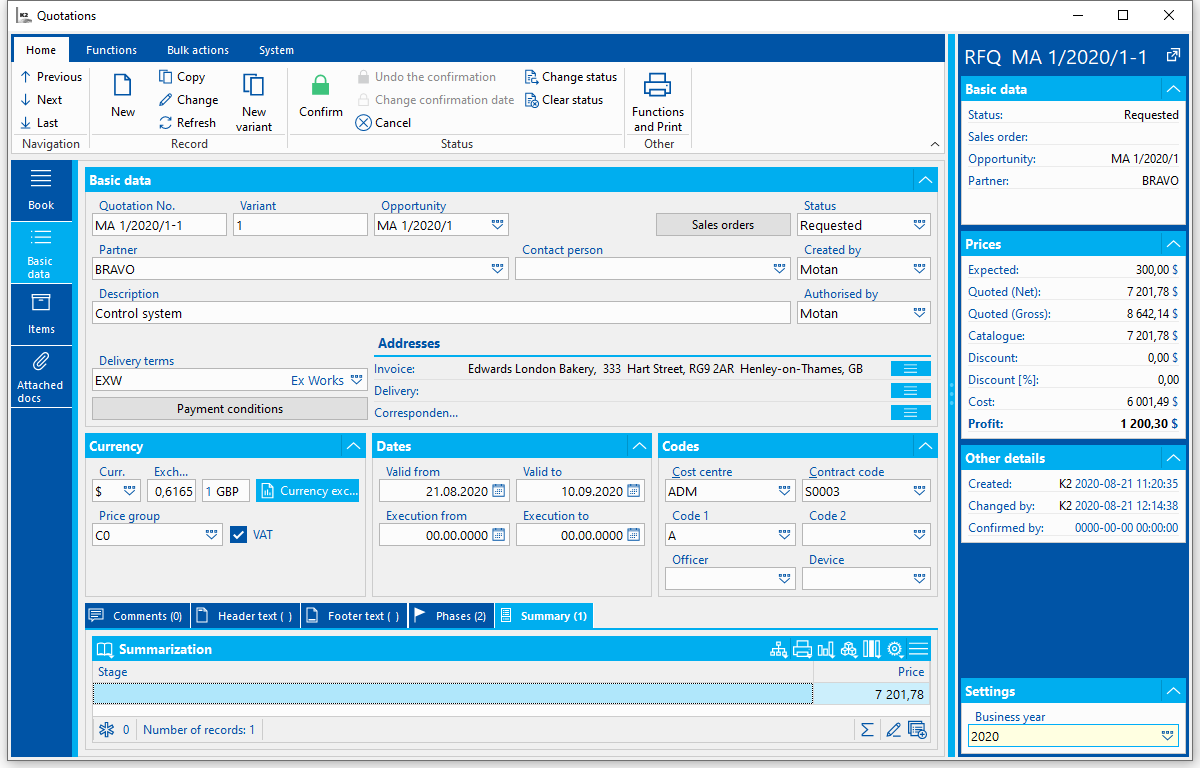
Picture: Offer - page 1 with open tab Phases
Description of Fields:
Document Number |
Ordinal number of displayed offer that is assigned by program automatically. |
Variant |
Variant of the offer. Value is displayed next to offer number. A new variant is created using the keyboard shortcut Ctrl + F6. |
Sales order |
Contract number and period. |
Opportunity |
Opportunity to which offer is linked. It can be linked via activity. Field cannot be edited via change. |
Status |
Offer status. Field can be filled with value from user-defined code list. |
Addresses |
Button to display addressee or superior firm. For further information, see Addressee chapter. |
Partner |
Partner that was communicated with regarding this offer. If we fill in partner, then list of all the contact persons that are assigned to this partner will be offered in Contact Person field (selection of contact persons will be displayed). |
Valid from |
Date from when the offer is valid. Current date is filled in implicitly. |
Valid to |
Date till when the offer is valid. Date is automatically filled by the program according to validity set in default settings of marketing book. |
Realization from |
Date from when the offer is executed. If there’s an option Update automatically “Execution from” and “Execution to” according to items checked in default settings of marketing book then it’s not possible to change data about item validity. |
Realization to |
End date of offer execution. If there’s an option Update automatically “Execution from” and “Execution to” according to items checked in default settings of marketing book then it’s not possible to change data about item validity. |
Contact person |
Contact person which has been communicated with regarding this offer. Filter of contact persons is offered implicitly for selected partner. If we select another contact person then value in Partner field is not changed. Contact Person field is not deleted in case of change in Partner field and originally entered value remains there. |
Currency |
Currency in which offer will be issued. |
Exchange Rate |
Exchange rate for recalculation between basic and foreign currency is also displayed in this field. |
Price group |
Price group of the offer. This price group is automatically added according to price group defined in Suppl./Cust. card and is further copied into the sales order items. |
Processed by |
Link to Contact persons book. List of all contact persons is offered. |
Issued by |
Date and name of user who prepared the offer. |
Approved by |
Link to Contact persons book. It offers list of all contact persons which are assigned to their own company (filter of contact persons is displayed). |
Change |
The date and name of the user who changed the opportunity. |
Description |
Any description to differentiate individual offers. |
Payment Conditions |
Button is used to set up payment conditions for given offers. The detailed description is stated in the Purchase and Sale Shared Elements - Payment conditions chapter. |
Confirmed |
Date and name of the user who confirmed the offer. |
Cost Centre |
A cost centre of a firm. Field in Offer document is not mandatory. If Cost Centre field is set atPartner, then its value is filled to this field at offer creation. If Cost Centre field is set inMarketing book set-up, then its value is filled to this field at offer creation. Note: If field is not entered and if offer becomes sales order, then value for field Cost Centre in sales book is filled to Cost Centre field in sales order. |
Contract code |
Contract code. Field in Offer document is not mandatory. If Sales Order code field is entered atPartner, then its value is filled to this field at offer creation. If the field is not entered in Partner but Sales Order code field is entered in Marketing book set-up, then its value is filled to this field at offer creation. Note: If field is not entered and if offer becomes sales order, then value for field Sales Order code in sales book is filled to Sales Order code field in sales order. |
Device |
Reference to Device book. If field is set at Partner, then its value is filled to this field at offer creation. |
Code1, Code 2 |
Possibility of setting any code. It serves for user identification. If Code 1orCode 2fields are entered atPartner, then its value is filled to these fields at offer creation. |
Officer |
It enables to assign responsible person. (It is a link to personnel data.) If field is set at Partner, then its value is filled to this field at offer creation. |
Offered price |
Sum of offered prices from items. |
Discount |
Sum of absolute discounts from items. |
Discount [%] |
Sum of percentage discounts from items. |
Expected price |
Sum of expected prices from items. |
Catalogue price |
Sum of catalogue prices from items. |
Cost price |
Sum of cost prices from items. |
Profit |
Sum of profit prices from items. |
Prices in document currency |
Button |
Gross price |
Button |
In this page, like in other modules, we can add notes. Closer description of work with notes is stated in Basic Code Lists and Supporting Modules K2 – Notes chapter
Apart from standard document tabs Offer card contains also tabs:
Phases
Course of implementation can be divided into several phases of which each phase can have its own date of implementation. These phases are defined only for specific document. It’s user defined code book.
Summary
In Summary tab under chosen structure are displayed data according to selected criteria. Criteria is:
- Phase
- Group
- Phase/Group
- Group/Phase
- Deadline
- Deadline/Phase
- Deadline/Group
- Deadline/Phase/Group
- Deadline/Group/Phase
- Deadline grouping
- Years
- Quarters
- Monthly
- Weekly
Price is then summed up according to selected conditions.
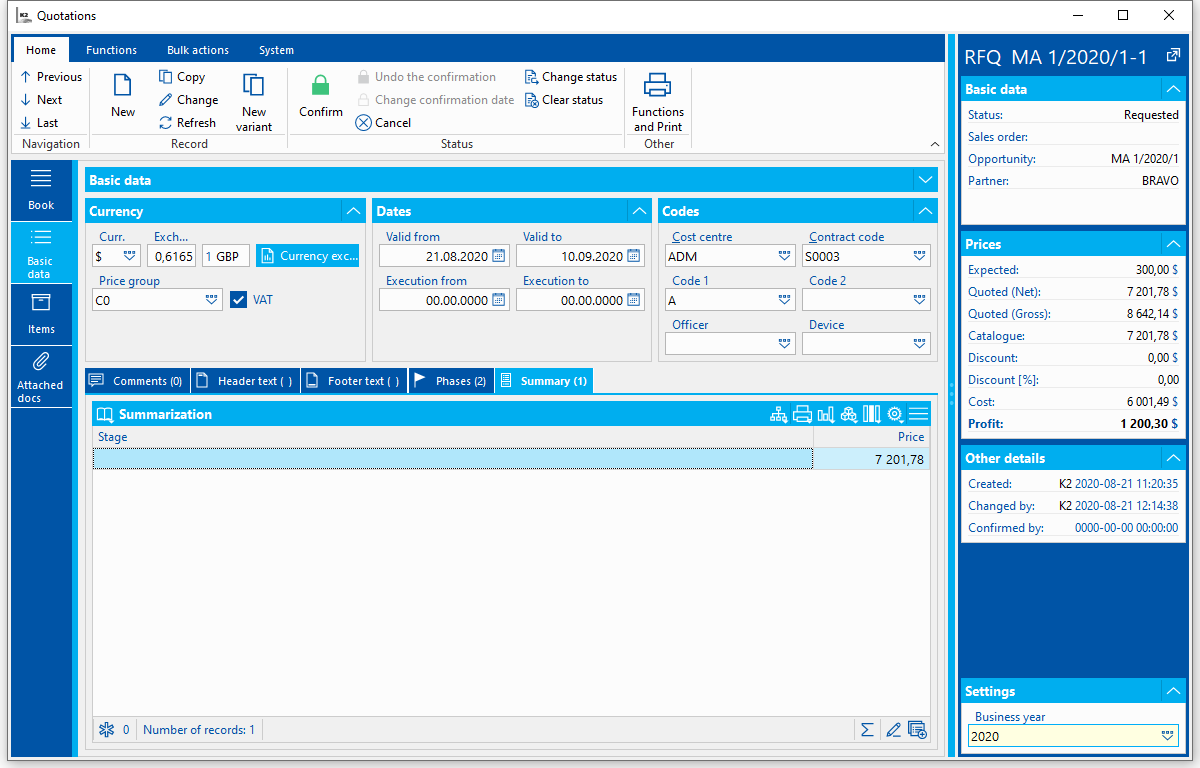
Picture: Tab Summary - grouping Phase/Group
Items (page 2)
On document page 2 items of goods and services, which are not in product code book, are entered, items can be linked to logical groups, demand requests as well as new alternative offers can be created and also various comments can be added.
Basic data of the offer are displayed in form header. Page 2 of the document is divided into two tables, which contain Requested ItemsandOffered Items.
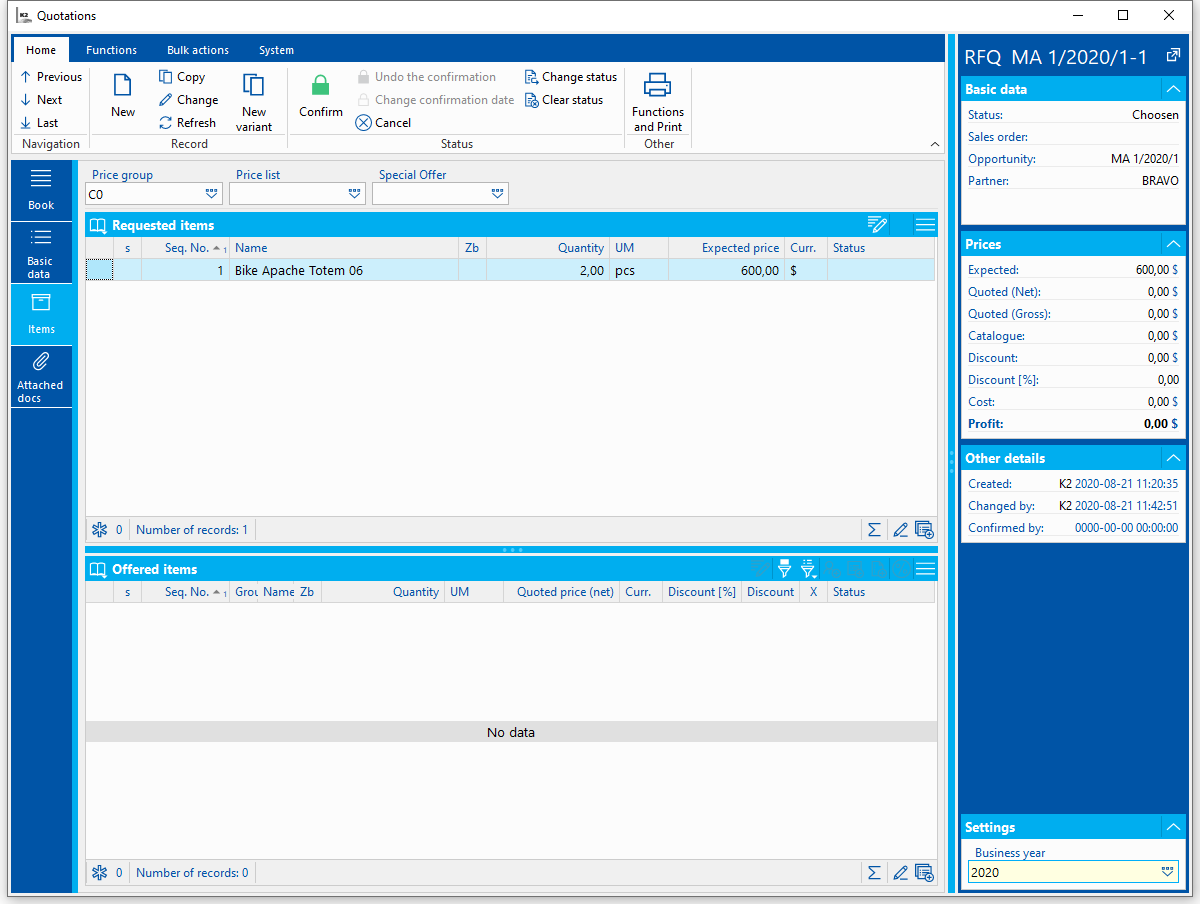
Picture: Offer - page 1
In upper table information related to requested goods or services are displayed, in bottom table are information about offered goods or services. Item, which is entered in item form only as a text and which doesn't have goods from Products book assigned, is marked with icon![]()
Summed data about prices are displayed in bottom part of the form. These are the same fields like in page 1 of the document.
Buttons' Description:
|
Edit items by row. |
|
Mark item with asterisk. |
|
Mark all records with asterisk. |
|
Undo marking of all items. |
|
Form for mass change of all items is popped up. |
|
Item marked with ruler is moved up. |
|
Item marked with ruler is moved down. |
|
Only related items are displayed. |
|
Only items from selected group are displayed. |
|
Demand requests are created from items marked with asterisk. |
|
Selected items marked with asterisk are added to selected demand requests. |
|
New demand request for supplier is created from items marked with asterisk. |
|
Items marked with asterisk are moved from Requested Items table to Offered Items table. |
|
It allows switching between basic and foreign currency. |
|
It allows switching between netto and Gross price. |
|
It displayes prices per unit. |
Requested Items:
New requested item is entered in Change or via New entry with Ins key, Demand Item - Requested form or Products book are displayed after pressing the key and based on user parameter When entering item of product offer. We can pop up the same form if in offer we mark selected item with ruler and press Enter.
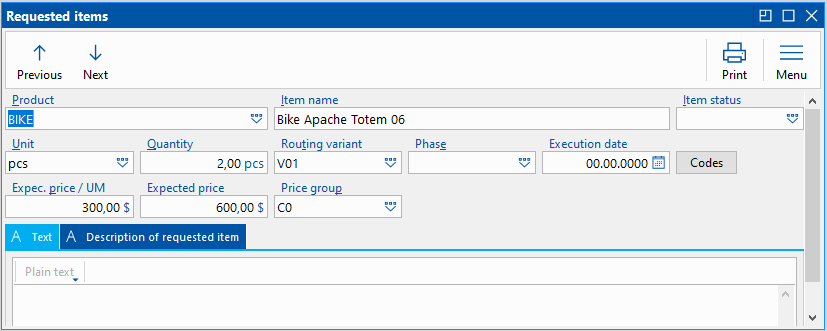
Picture: Demand Item - requested
Description of Fields:
Product |
Product or service from Product code book. It’s not mandatory to fill in the field. |
Item name |
Various text can be entered. |
Unit |
Stock unit item of product. |
Quantity |
Requested quantity. |
Item status |
Field can be filled with value from user-defined code list. |
TP variant |
In this field we can enter technology process variant of product or semi-finished product. |
Phase |
Possible add of phase for requested item. |
Implementation date |
Date from when the offer is executed. If item has assigned phase then implementation date is taken from selected phase and cannot be changed on item. |
Prices in document currency |
Button |
Price group |
Input field to enter price group of item. When creating item the entry is copied from source item or from document header. |
Officer |
Link to personal data. For the first item, it is copied from Sales order header, for all others it is copied from active item with positioned cursor when opening the form. |
Expected price |
Expected price from demand submittor. |
Internal Text tab can be used for random text which is for internal information only.
Offered items:
New offered item can be inserted the same way like requested item (Ins).
Form Offer items - offered is divided into three tabs.
Basic data tab
Tab in upper part contains the same fields like requested items in the form.

Picture: Form Offer item - offered (Basic Data tab)
Description of Fields:
Requested Item |
Item from Requested Items table. This way offer item is linked with requested item. Pressing button |
Product |
Product or service from Product code book. It’s not mandatory to fill in the field. |
Item name |
Various text can be entered. |
Unit |
Stock unit item of product. |
Quantity |
Requested quantity. |
Item status |
Field can be filled with value from user-defined code list. |
TP variant |
In this field we can enter technology process variant of product or semi-finished product. |
Phase |
Possible add of phase for requested item. |
Implementation date |
Date from when the offer is executed. If item has assigned phase then implementation date is taken from selected phase and cannot be changed on item. |
Group |
Items can be linked in logical groups. User defined code book which is defined for all offers. |
It’s calculated in total document price |
By choice we define if item should be calculated in total offer price. An item that does not have this option checked is marked with an icon |
Prices in document currency |
Button |
Offered price |
Price at which product item is offered. There are icons for easier orientation in origin of sales price on item next to Offered price field, which like data in Price group field, are directly related pricing options. Pricing is further described in 5th page of Article card chapter, eventually in the methodology Creation of prices in IS K2.
Same principle of icon display is used also at purchasing and sales items. |
Discount |
Absolute item discount. |
Discount [%] |
Percentage item discount. |
Catalogue price |
Basic sales price from page 5 of Products card. |
Costs |
If product is filled at item then Product stock price is inserted and in case item in Offered by Partners tab is marked with Selected(F7) status, then price from this item is inserted. |
Profit |
It is profit at item (difference between costs and revenue). |
Profit [%] |
Profit in % is entered. When entered Offered Price is recalculated (based on calculation of Cost Price). |
Implementation date |
Date from when the offer is executed. If item has assigned phase then implementation date is taken from selected phase and cannot be changed on item. |
VAT rate |
VAT rate is uploaded from Product card. If item doesn’t have Product card, VAT rate is filled from default settings of Marketing book. |
Price group |
Input field to enter price group of item. When creating item the entry is copied from source item or from document header. |
Officer |
Link to personal data. For the first item, it is copied from Sales order header, for all others it is copied from active item with positioned cursor when opening the form. |
Gross price |
Button |
Internal Text tab can be used for random text which is for internal information only.
Business Text tab is used to enter comment to offered item. If sales order is created from offer, Business Text is displayed in Description field at sales order item.
Requested at Partners tab
Tab displays overview of created demands on this item.
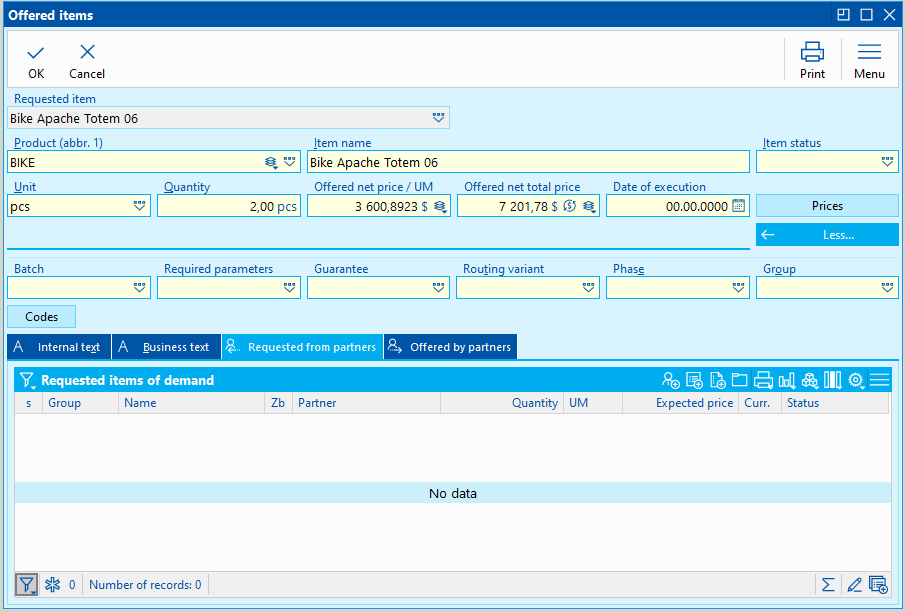
Picture: Form Offer item - offered (Requested at Partners tab)
On this tab you can also use the icon ![]() to create demands for selected partners (Ctrl + F7), the icon
to create demands for selected partners (Ctrl + F7), the icon![]() to create a new demand for suppliers (Alt + F7), the icon
to create a new demand for suppliers (Alt + F7), the icon ![]() to add an item to demands (Shift + F7) or the icon
to add an item to demands (Shift + F7) or the icon ![]() to connect to the required demand item (Ctrl + Shift + F7).
to connect to the required demand item (Ctrl + Shift + F7).
Offered by Partners tab
Tab displays list of partners which sent offer to this item.
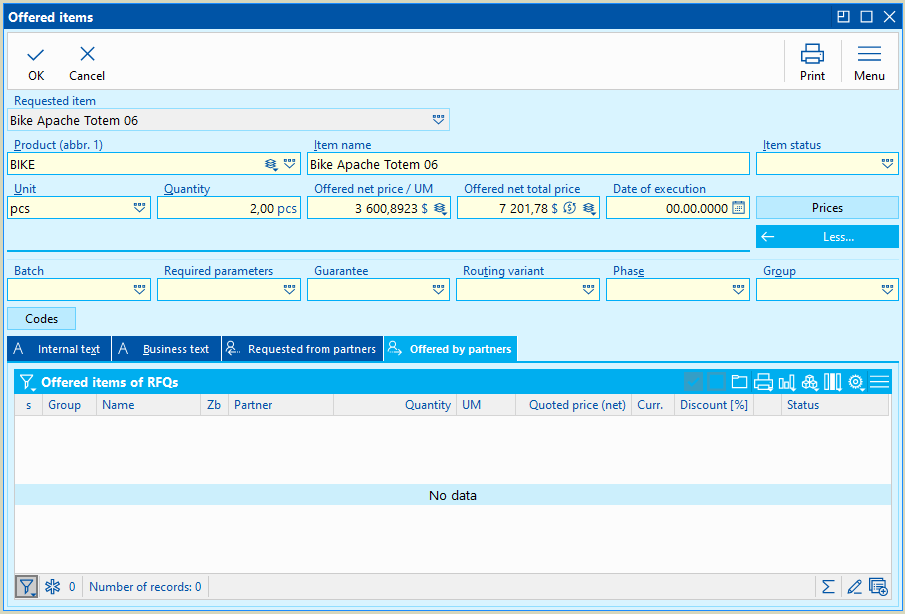
Picture: Form Offer item - offered (Offered by Partners tab)
On this tab, use the F7 key or the icon![]() to mark the items with the status for implementation. Use the icon
to mark the items with the status for implementation. Use the icon![]() to cancel the status for implementation and the icon
to cancel the status for implementation and the icon![]() or the Alt + Shift + F7 key to connect to the offered demand item.
or the Alt + Shift + F7 key to connect to the offered demand item.
Documents (page 9)
It is possible to add documents, processes or K2 documents on the 9th(see the Basic Code Lists and Supporting Modules K2 – 9thpage). Page chapter).
Function over Offers book
Description of functions:
F7 |
If document is in appropriate status (Document Status for Implementation), program allows to create Sales Order from Offer. Before Sales Order document is created, all offered items must have real Products card entered. When Sales Order document is created, link to the offer from which it’s been created is saved on page 9 of the Sales Order. If Master Card is the type of offered item, then error message that no specific product type is selected is displayed, when we try to create sales order. |
F8 |
Document cancellation/undo cancellation. |
Alt+F10 |
Switching among books. |
Ctrl+F6 |
New offer variant |
Ctrl+F7 |
Creates demand for partner. |
Alt+F2 |
Document confirmation. |
Ctrl+F2 |
Undo confirmation of document. |
Ctrl+Z |
Switch to Sales Order document. |
Ctrl+Enter |
Switch to Partners book (only from page 1). |
Ctrl+Shift+ Enter |
Switch to Suppl./Cust. book (only from page 1). |
Demands
Demands book is dedicated to create and execute demands from addressed suppliers as well as received demands from customers. By evaluating information we can better identify supplier which suits the best our requests or requests from customer.
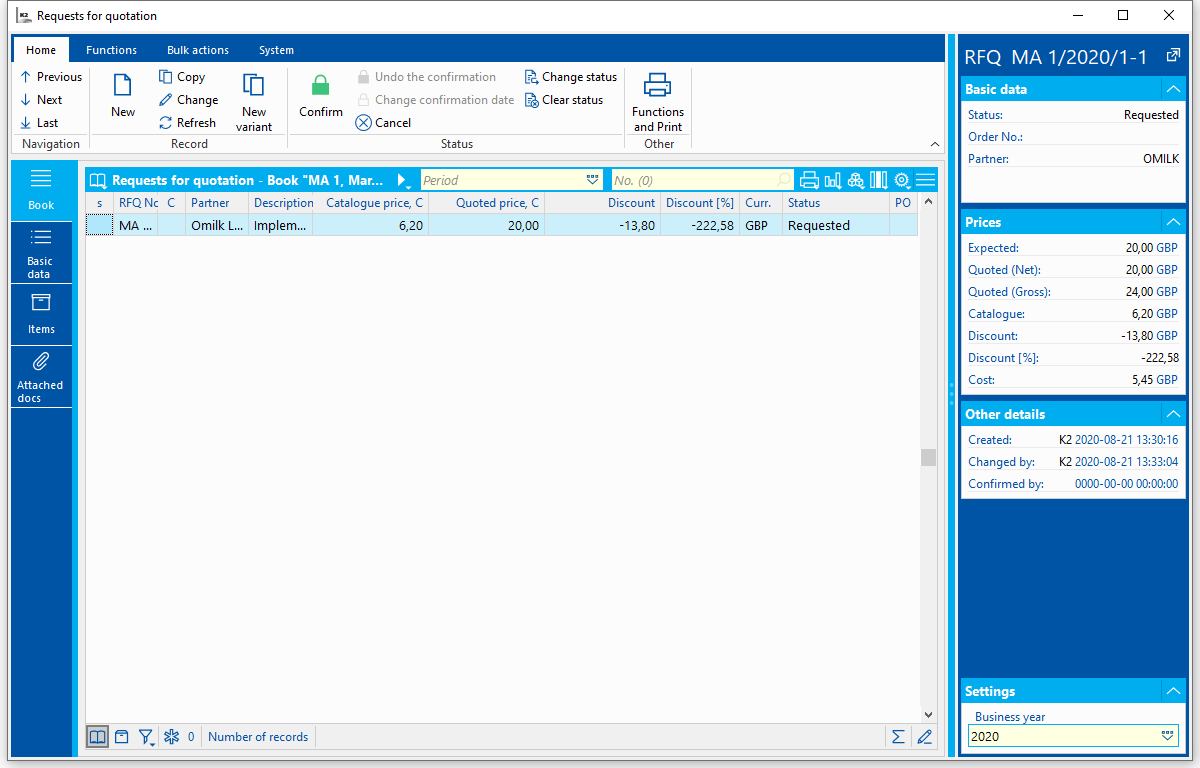
Picture: Demands - book
Basic Data (page 1)
Description of Demand basic data as well as its function and mass processing are similar like at Offers.
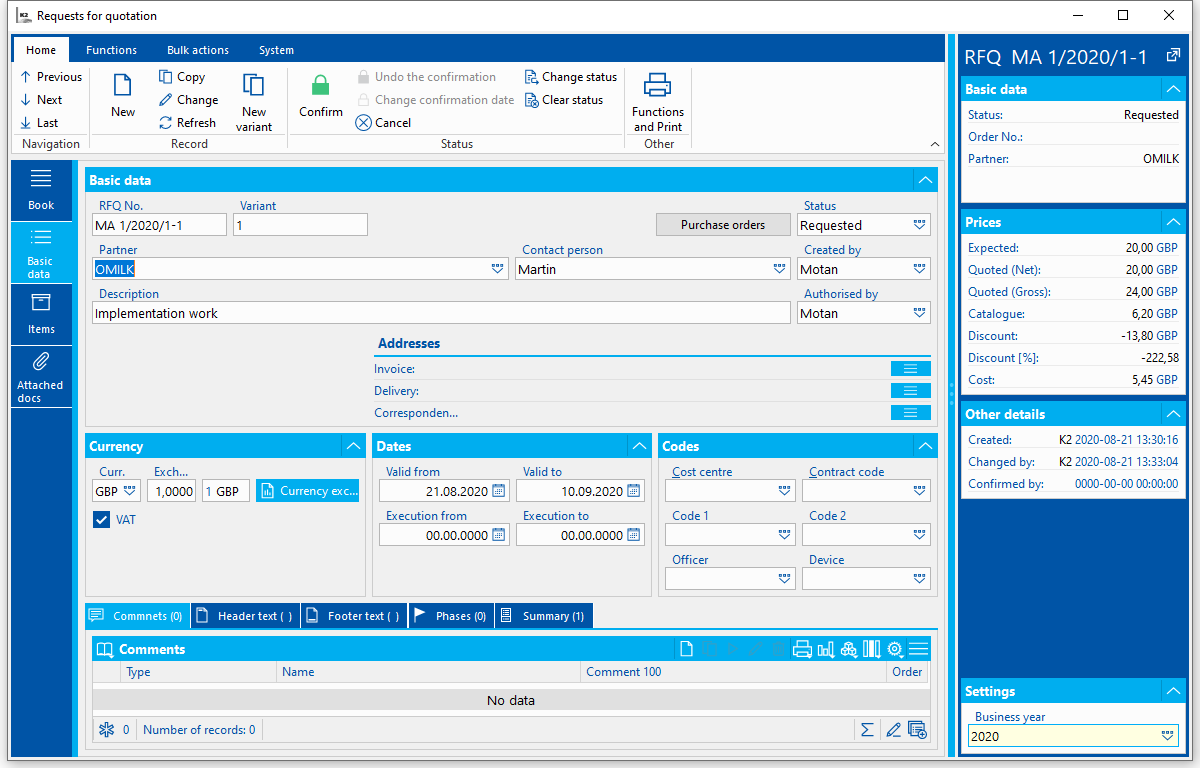
Picture: Demands - book
Items (page 2)
On document page 2 items of goods and services, which are not in product code book, are entered, items can be linked to logical groups, create requests as well as new alternative demands can be created and also various comments can be added.
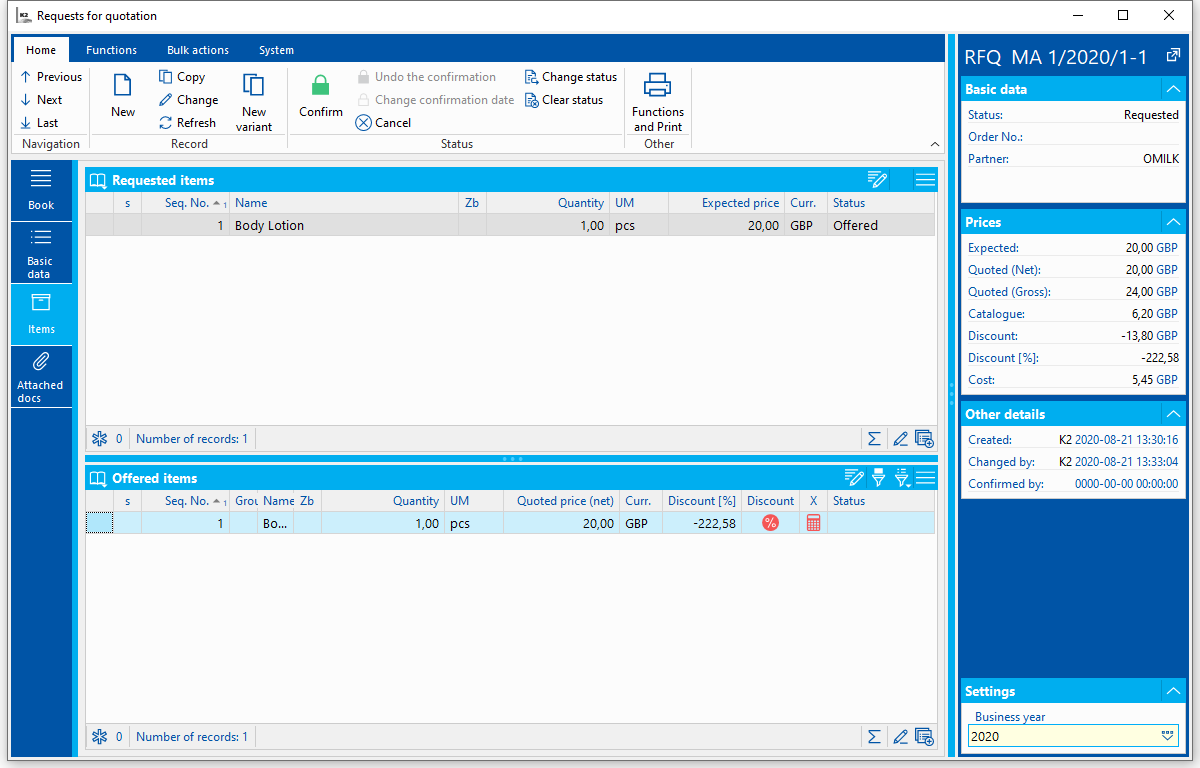
Picture: Demand - page 2
Second page of the document is the same as second page of Offer document. Differencies are described further down.
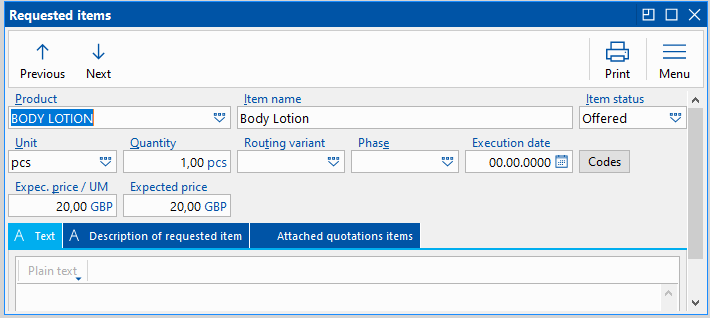
Picture: Demand Item - offered form
Difference between Demand Item - offered and Offer Item - offered is, that item form is not divided into further tabs.
Documents (page 9)
9. It is possible to add documents, processes or K2 documents on the 9th(see the Basic Code Lists and Supporting Modules K2 – 9thpage). Page chapter).
Function over Demands book
Description of functions:
F7 |
If document is in required status (Document Status for Implementation), program allows to create Sales Order from Demand. Before Sales Order document is created, all offered items must have real Products card entered. When Sales Order document is created, link to the Demands from which it’s been created is saved on page 9 of the Sales Order. |
F8 |
Document cancellation/undo cancellation. |
Alt+F10 |
Switching among books. |
Ctrl+F6 |
New offer variant |
Ctrl+F7 |
Creates demand for partner. |
Alt+F2 |
Document confirmation. |
Ctrl+F2 |
Undo confirmation of document. |
Ctrl+O |
Switch to Sales Order document. |
Ctrl+Enter |
Switch to Partners book (only from page 1). |
Ctrl+Shift+ Enter |
Switch to Suppl./Cust. book (only from page 1). |
Offers and Demands comparison
Compare function allows user to compare offered document items. Maximum 3 documents can be compared. Function can be called up with Shift+F4 over Offers and Demands books.
Documents marked with asterisk or document currently marked with ruler are uploaded to the form, further documents can be selected in the form.
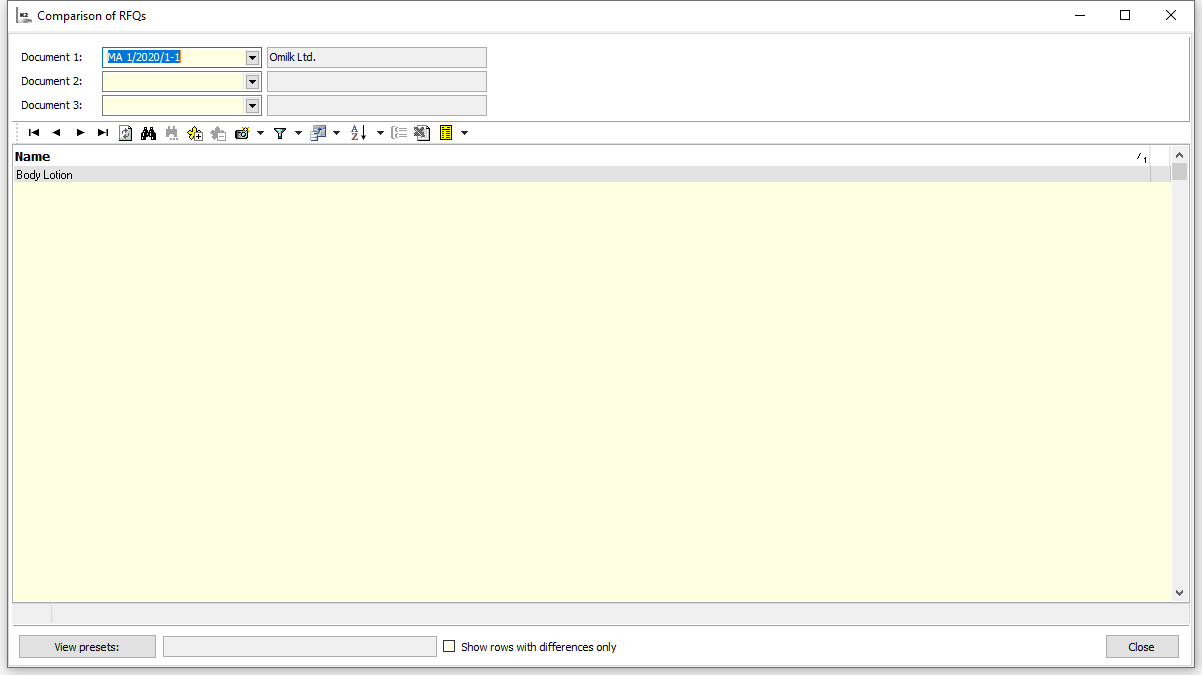
Picture: Offers’ Comparison form
Individual columns are marked with document number to which they relate.
Display Preference button defines columns which we want to compare.
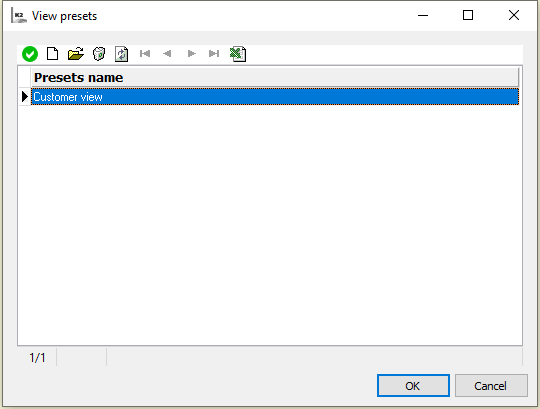
Picture: Display Preference form
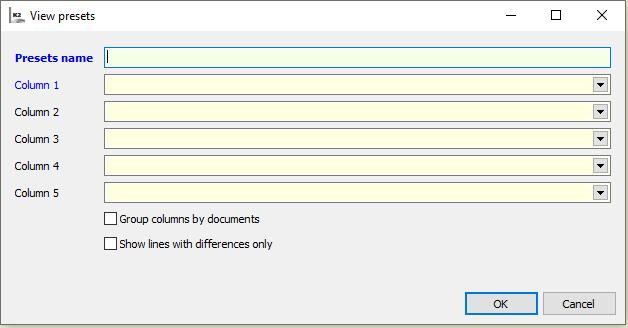
Picture: Display Preference form - page 1
Option Group Columns within Document allows to display columns from one document next to each other.
![]() marks those items of which columns of compared documents don’t equal. By choosing option Display only Different Rows they will get grouped.
marks those items of which columns of compared documents don’t equal. By choosing option Display only Different Rows they will get grouped.
By confirming item currently marked with ruler in compared columns with Enter key, form Offer Item - offered will get open. Page 1 of Product card will get open when items currently marked with ruler at item name get confirmed with Enter key.
Books Administration - Marketing
Similar like in Purchasing, Sales and Warehouse books we define period and numbering also in administration for individual Marketing books. Here we also do default settings of Offer and Demand books.
Closer description of work with Administration of books module is stated in Chapter Administrator - Administration of books.
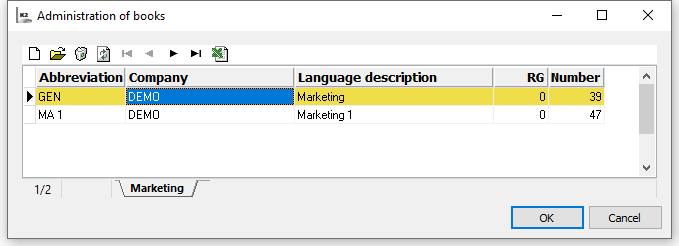
Picture: Administration of books form
Default settings
For correct functionality of Offer and Demand books it’s necessary to do their settings.
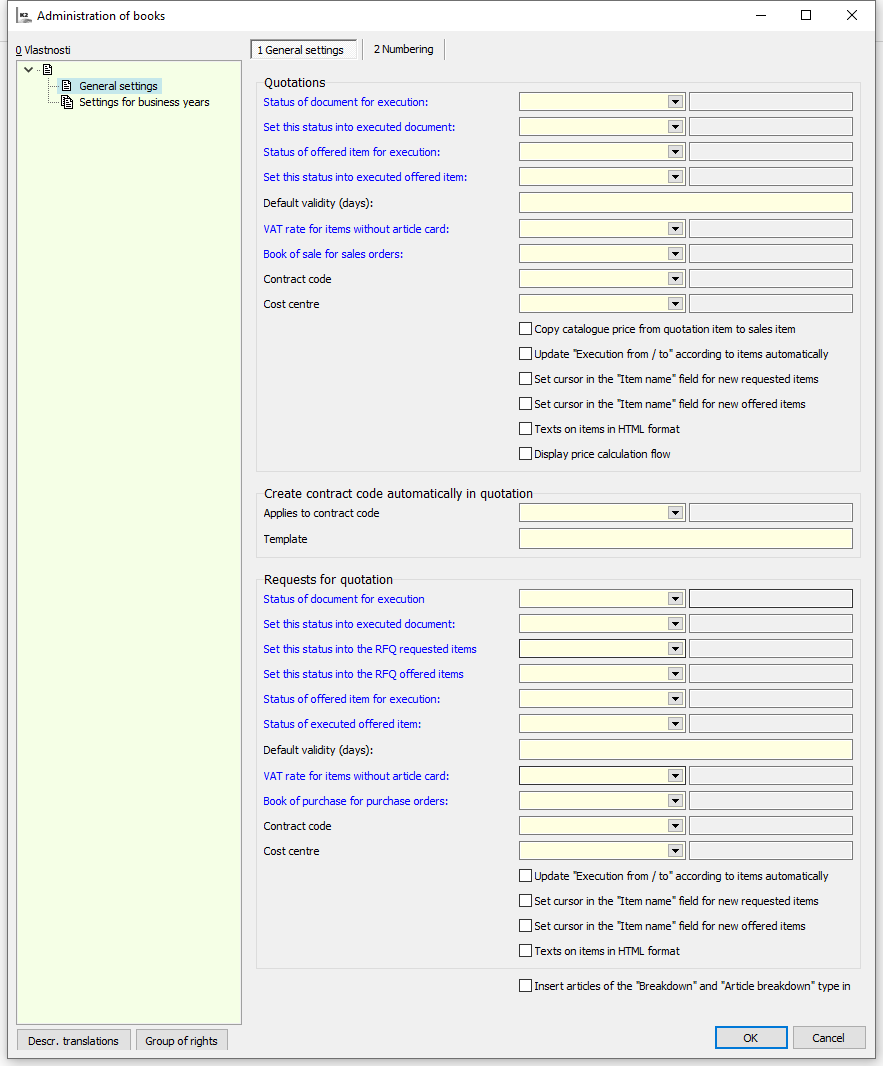
Picture: Administration of books - Default Settings
Description of Fields:
Document status (for implementation of offered and requested item etc.) |
All fields related to document statutes are user defined code books. Appropriate item status will be filled to document by the program when selecting item e.g for implementation, for demand or offer. |
Predefined duration of validity (days) |
Predefined duration of validity for Offer or Demand. |
VAT rate for items without product card |
VAT rate which will be automatically pre-filled to item which doesn’t have product card. |
Sales book for sales order creation |
Settings of default sales book to create sales order. |
Take catalogue price from offer item to sales item |
Catalogue price of product will be automatically taken from offer item to sales item. |
Automatically update “Implementation from” and “Implementation to” according to items |
Option stops user to change data related to validity of Offer or Demand, instead they’ll be updated automatically according to dates entered at items or possibly atphases of given document. It confirms the appropriate document. |
At new requested item cursor to be positioned at “Item name” field |
Cursor is automatically positioned on Item Name field when entering new data to Requested Items form. |
At new requested item cursor to be positioned at “Item name” field |
Cursor is automatically positioned on Item Name field when entering new data to Offered Items form. |
Texts on items should be entered in HTML format |
Texts on items will be automatically entered in HTML format. |
Product type “Breakdown” and “Product Breakdown” to be entered the same way like in Purchasing/Sales |
Product type Breakdown and Product Breakdown will behave the same way in offered items like in Purchasing/Sales. Sales prices are respected. If not ticked then price will be re-calculated according to product quantity entered in breakdown items. |
Contract code |
When creating offers/demands value from this field will be filled to Contract Code field in offer/demand. |
Cost Centre |
When creating offers/demands value from this field will be filled to Cost centre field in offer/demand. |
Automatic creation of contract code in the menu (Applies to contract code, Template) |
By setting up a template for creating an contract code, you can ensure that the contract code is automatically created in the offers documents. The contract code according to the template is created when saving a new offer document and replaces the code in the document in its header and items, which is defined as a code to be overwritten (the field Applies to the contract code). The contract code created according to the template has an internally saved flag that it is an automatically generated code. When copying a offer that has such a code (in the header or items), the new offer will be replaced by a code that is designated as a code to be overwritten, and then when saving a new contract, a new code will be created according to the template. The template is created using standard "at" parameters, as well as, for example, the definition of a variable symbol. Example: @KN () @ OB (2) @CI (N04) creates the contract code in the format of the full contract number (book + period + order number supplemented by zeros to four characters). |


 only offered items are displayed which in form have assigned requested item with ruler positioned in upper table.
only offered items are displayed which in form have assigned requested item with ruler positioned in upper table.